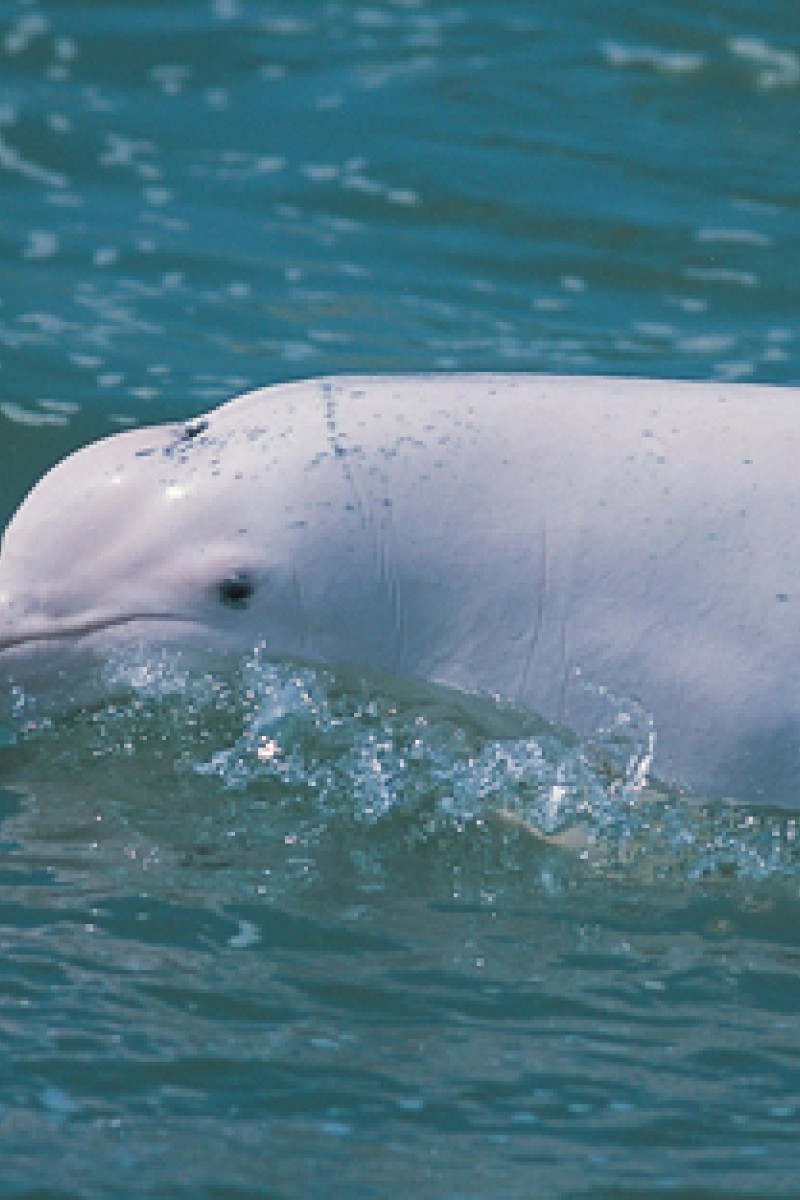
Marine biologists are fighting to save Hong Kong's friendly sea creatures from a bleak future
 Water pollution, increased sea traffic and habitat loss have been blamed for the declining numbers of Chinese White Dolphins.
Water pollution, increased sea traffic and habitat loss have been blamed for the declining numbers of Chinese White Dolphins.It's a special sight off the island of Lung Kwu Chau, near Tuen Mun. Dozens of bubble-gum pink dolphins and grey youngsters were merrily riding waves and chasing fish. The weather was dreary, but the Chinese white dolphins were having the time of their lives.
Cherished by locals and tourists, the fun-loving dolphin has long been seen as a symbol of Hong Kong. Despite its name, the species is grey when it is young, and pink as an adult.
Last month, Young Post tagged along with marine scientists and the Ocean Park Conservation Foundation (OPCF) to watch the endangered marine mammals frollicking in the sea.
Experts say such spectacles may vanish in 60 years. Biologists are racing against time to study the humpback dolphin, hoping to save it before it disappears.
The species is classified as "near threatened" by the International Union for Conservation of Nature, an environmental group that releases a "red list" of at-risk species. About 2,500 Chinese white dolphins live in the Pearl River Delta, among which 100 to 250 call northern Lantau home.
On the day of the trip, researcher Leszek Karczmarski described the plight of the sea creatures and what he was doing to help better protect their habitat.
He and his team from the University of Hong Kong are trying to find out how the dolphins are faring and where they hunt and mate. They launched a project in 2010 - funded by OPCF - that builds on the work of biologist Samuel Hung Ka-yiu and others.
Hung, founder of the Hong Kong Dolphin Conservation Society, and Thomas Jefferson, a pioneer in dolphin research, have monitored the animals since the 1990s. They helped create an important baseline survey, but Karczmarski takes the research one step further. He has been compiling historical data, matching individuals spotted at sea to a photo-identity bank and logging their activities.
In a preliminary analysis, their numbers have been declining by at least 2.5 per cent every year. "Their population might drop to a point beyond return by as early as 2070," Karczmarski says.
The decrease may be a result of several factors, such as water pollution, increased sea traffic and habitat loss. Scientists find parasites, tumours and pollutants in dolphin corpses. The toxic material found in the milk of females is enough to distress calves or even kill them.
Karczmarski is worried the dolphins exist only as a "ghost population". "They are still around, but only just," he says.
Karczmarski thinks it is key to reduce pollution in their habitat. He calls for stricter environmental standards and stronger enforcement of anti-pollution laws.
Habitat along coastlines must be protected from land reclamation, he adds. The animals tend to hunt and seek shelter in waters no deeper than 30 metres.
Chinese white dolphins are particularly vulnerable because they don't adapt as well to changes as bottlenose dolphins.
A full picture of their survival status will come to light in three years. "It is a labour-intensive job," Karczmarski says. He hopes to expand his study with biopsies and GPS tagging.
It is not too late to change the dolphins' future, he says.
It's about maintaining nature's balance - like a game of Jenga, says OPCF director Suzanne Gendron. All species are interconnected, and pulling a species out of the system will topple everything.
"Even before the whole tower falls down," she says, "each species lost will deplete our soul."
